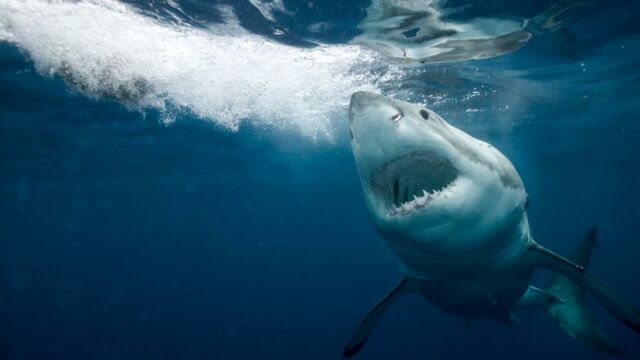World's most battered great white shark spotted

Swimming 100 metres off the coast of Australia, the world's most battered great white shark was spotted. He had the most amount of scars a human had seen on a shark.
It is said that, a knight in shining armour is a knight who never had his armour tested. Such is the case with the world’s most battered Shark, the great white shark, captured near the Neptune islands, South Australia in January. The shark is seen coated with the most amount of battle scars all across his body.
Discover our latest podcast
Rare friend
The Neptune Islands are said to be home to an estimated school of 1000 great white sharks, swimming 100 metres from the coast.
More under this adMore under this adFor a very long time, cameramen have tried to capture images of these marvellous deep-sea creatures, but all of their attempts were unsuccessful. However, underwater cameraman, Dean Spraakman, was able to film a spectacular video of the 3.3 metre male shark, during an excursion in January.
According to research published in the Journal of the Royal Society Interface, young great white sharks are reported to attack humans, given their poor eyesight and difficulty distinguishing humans from other animals. But, in spite of this, Spraakman added how ‘friendly’ this particular shark was while filming him.
More under this adMore under this adThe terrible condition of the shark, got the whole crew questioning the reason for such scars. No one had ever seen such a battered shark in their life.
Spraakman said:
We see sometimes down there the white sharks tracking stingrays because they hunt and eat them and we thought they chase them into shallow reef areas where it’s quite sharp and it might get stuck and cause that sort of damage.More under this adMore under this ad
You can only speculate what happened there and to be honest no one ever really knows what causes that sort of damage to a shark, but the poor guy had a bit of a hard time I think.
Vulnerable creature
Great white sharks are the world's largest known predatory fish, according to the World Wide Fund for Nature (WWF). Instead of digesting their food, the animals shred it into 'mouth-sized pieces,' which are then 'swallowed whole,' according to the organization.
More under this adMore under this adThe International Union for Conservation of Nature has classified great white sharks as ‘vulnerable’—only one step away from being considered ‘endangered.’
Even then, according to the National Geographic, there are presently no valid population statistics on great white sharks. Despite this, experts concur that their populations are declining owing to overfishing, unintentional entanglement in fishing gear, and other fatal factors.
More under this ad